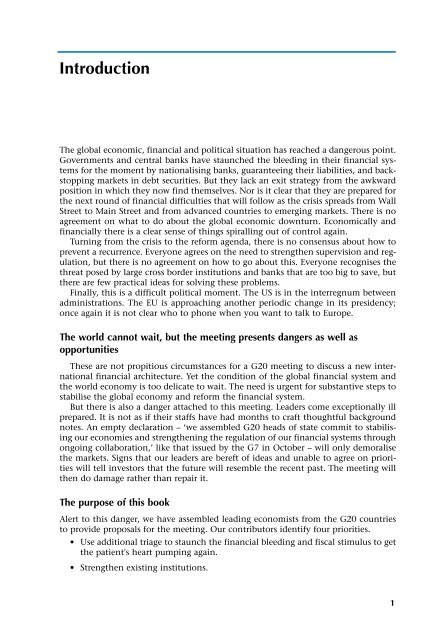What G20 Leaders Must Do To Stabilise our Economy and Fix ... - Vox
What G20 Leaders Must Do To Stabilise our Economy and Fix ... - Vox
What G20 Leaders Must Do To Stabilise our Economy and Fix ... - Vox
You also want an ePaper? Increase the reach of your titles
YUMPU automatically turns print PDFs into web optimized ePapers that Google loves.
IntroductionThe global economic, financial <strong>and</strong> political situation has reached a dangerous point.Governments <strong>and</strong> central banks have staunched the bleeding in their financial systemsfor the moment by nationalising banks, guaranteeing their liabilities, <strong>and</strong> backstoppingmarkets in debt securities. But they lack an exit strategy from the awkwardposition in which they now find themselves. Nor is it clear that they are prepared forthe next round of financial difficulties that will follow as the crisis spreads from WallStreet to Main Street <strong>and</strong> from advanced countries to emerging markets. There is noagreement on what to do about the global economic downturn. Economically <strong>and</strong>financially there is a clear sense of things spiralling out of control again.Turning from the crisis to the reform agenda, there is no consensus about how toprevent a recurrence. Everyone agrees on the need to strengthen supervision <strong>and</strong> regulation,but there is no agreement on how to go about this. Everyone recognises thethreat posed by large cross border institutions <strong>and</strong> banks that are too big to save, butthere are few practical ideas for solving these problems.Finally, this is a difficult political moment. The US is in the interregnum betweenadministrations. The EU is approaching another periodic change in its presidency;once again it is not clear who to phone when you want to talk to Europe.The world cannot wait, but the meeting presents dangers as well asopportunitiesThese are not propitious circumstances for a <strong>G20</strong> meeting to discuss a new internationalfinancial architecture. Yet the condition of the global financial system <strong>and</strong>the world economy is too delicate to wait. The need is urgent for substantive steps tostabilise the global economy <strong>and</strong> reform the financial system.But there is also a danger attached to this meeting. <strong>Leaders</strong> come exceptionally illprepared. It is not as if their staffs have had months to craft thoughtful backgroundnotes. An empty declaration – ‘we assembled <strong>G20</strong> heads of state commit to stabilising<strong>our</strong> economies <strong>and</strong> strengthening the regulation of <strong>our</strong> financial systems throughongoing collaboration,’ like that issued by the G7 in October – will only demoralisethe markets. Signs that <strong>our</strong> leaders are bereft of ideas <strong>and</strong> unable to agree on prioritieswill tell investors that the future will resemble the recent past. The meeting willthen do damage rather than repair it.The purpose of this bookAlert to this danger, we have assembled leading economists from the <strong>G20</strong> countriesto provide proposals for the meeting. Our contributors identify f<strong>our</strong> priorities.• Use additional triage to staunch the financial bleeding <strong>and</strong> fiscal stimulus to getthe patient's heart pumping again.• Strengthen existing institutions.1














